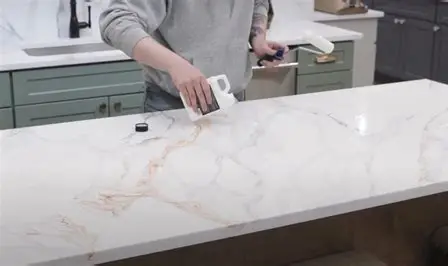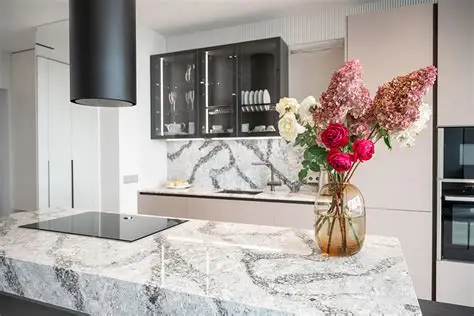Quartz countertops are among the most popular choices for both kitchens and bathrooms due to their durability, modern aesthetics, and low-maintenance appeal. But a question often asked by homeowners and renovators alike is: Do you have to seal quartz countertops? The short answer is no—but there’s a lot more to understand about why sealing isn’t required and how to properly maintain your quartz surfaces.
In this comprehensive guide, we’ll explore everything you need to know about sealing quartz, its composition, advantages, maintenance tips, and how it compares to natural stone alternatives.

What Are Quartz Countertops?
Quartz countertops are a type of engineered stone countertops, made by combining approximately 90–95% ground natural quartz with resins, polymers, and pigments. This manufacturing process results in a non-porous, highly durable surface that mimics the appearance of natural stone without the need for regular sealing.
👉 What Are Quartz Countertops?

Why Sealing Quartz Countertops Isn’t Necessary
Non-Porous by Nature
Unlike granite or marble countertops, quartz does not have microscopic pores that absorb moisture or stains. The resin binders fill any natural voids in the quartz, creating a smooth, non-porous surface. This means:
- No need for periodic sealing.
- Better resistance to bacteria, mold, and mildew.
- Easier daily maintenance.
👉 Do You Need to Seal Quartz Countertops?
The Exceptions: When You Might Consider Sealing
While factory-produced quartz slabs for countertops are non-porous, some lower-quality or DIY quartz surfaces might have imperfections or exposed edges where sealing could be considered. In rare cases, poorly maintained quartz can also benefit from a protective coating—not a traditional sealant, but more of a temporary surface enhancer.
Still curious? Learn more: 👉 How to Seal Quartz Countertops?
Pros and Cons of Quartz Countertops
Pros
- Low maintenance: No sealing required.
- Durability: Scratch and stain-resistant.
- Versatile aesthetics: Available in a variety of finishes including white quartz countertops, black quartz countertops, grey quartz countertops, Calacatta quartz countertops, and marble look quartz countertops.
- Consistent patterning: Ideal for modern, seamless designs.
- Hygienic: Non-porous surface resists bacteria growth.
Cons
- Not heat-proof: Prolonged exposure to high heat can damage resin.
- Less natural variation: Some prefer the organic patterns of granite or marble.
- Higher price tag: Quality quartz can be costly depending on region.
Quartz vs Granite Countertops
| Feature | Quartz Countertops | Granite Countertops |
|---|---|---|
| Porosity | Non-porous (no sealing required) | Porous (needs regular sealing) |
| Maintenance | Easy | Moderate |
| Natural appearance | Consistent look | Unique natural patterns |
| Heat resistance | Moderate | High |
| Cost | Moderate to High | Varies (can be affordable to high) |
Learn how to care for granite too:
👉 How to Clean White Granite Countertops?
👉 How to Clean Stained, Dull, or Gritty Granite Countertops?
Best Uses for Quartz Countertops
Quartz Kitchen Countertops
Quartz kitchen countertops are ideal for busy families. Their low maintenance and wide range of styles—from veined quartz countertops to Calacatta marble looks—make them a stylish and functional choice. Especially suited for:
- Modern kitchens
- Open-plan spaces
- Minimalist or Scandinavian designs
💡 Tip: Look for affordable white quartz countertops for modern kitchens at local suppliers.
Quartz Bathroom Countertops
Bathrooms benefit greatly from the non-porous nature of quartz, reducing the risk of mold and water damage. Consider quartz for:
- Vanity tops
- Shower surrounds
- Custom sinks
🛁 Discover the best types of quartz countertops for bathroom vanities to match your space.
How to Clean Quartz Countertops
While sealing isn’t needed, regular cleaning helps preserve quartz’s sleek look:
- Daily: Wipe down with warm water and mild dish soap.
- Stubborn stains: Use a non-abrasive cleaner or a mixture of vinegar and water.
- Avoid: Bleach, harsh chemicals, and abrasive scrubbers.
Learn more: 👉 How to Clean Quartz Countertops
Quartz Countertop Installation & Cost
Quartz Countertop Installation Cost
Installation prices vary based on the material, fabrication, and location. On average:
- Basic budget quartz countertops: $50–$70 per sq. ft.
- Mid-range quartz: $70–$100 per sq. ft.
- Premium quartz (e.g., Calacatta): $100–$150+ per sq. ft.
Factors impacting cost:
- Edge profile
- Custom cuts
- Installation complexity
- Region
Search: Quartz countertops near me, or Quartz countertops in [city/region] to get accurate pricing.
Finding a Trusted Installer
For a perfect fit and finish, opt for custom quartz countertop installers or visit local quartz countertop suppliers and quartz countertop showrooms for samples and design ideas.
DIY Quartz Countertop Installation Tips
Although professional installation is recommended, handy DIYers might take on small-scale jobs. Here are tips:
- Always measure precisely and order extra material.
- Use a strong adhesive rated for engineered stone.
- Ensure base cabinets are level and sturdy.
- Use caulk or epoxy for seams, and clamp until dry.
🔧 Need help? Check out our full guide: DIY quartz countertop installation tips (article coming soon!)
Are Quartz Countertops Worth It?
Absolutely—if you’re looking for a low maintenance, visually stunning, and durable surface that mimics the charm of natural stone without the upkeep, quartz is a great investment. From white and black quartz countertops to veined quartz countertops with dramatic designs, there’s an option for every aesthetic.
Conclusion
So, do you have to seal quartz countertops? The definitive answer is no. Thanks to their non-porous engineered surface, quartz countertops require no sealing—making them a perfect option for those who want beautiful, hygienic, and low-maintenance quartz countertops for busy families.
Whether you’re updating your kitchen, planning a luxurious bathroom vanity, or comparing quartz vs granite countertops, quartz delivers value, style, and performance.

